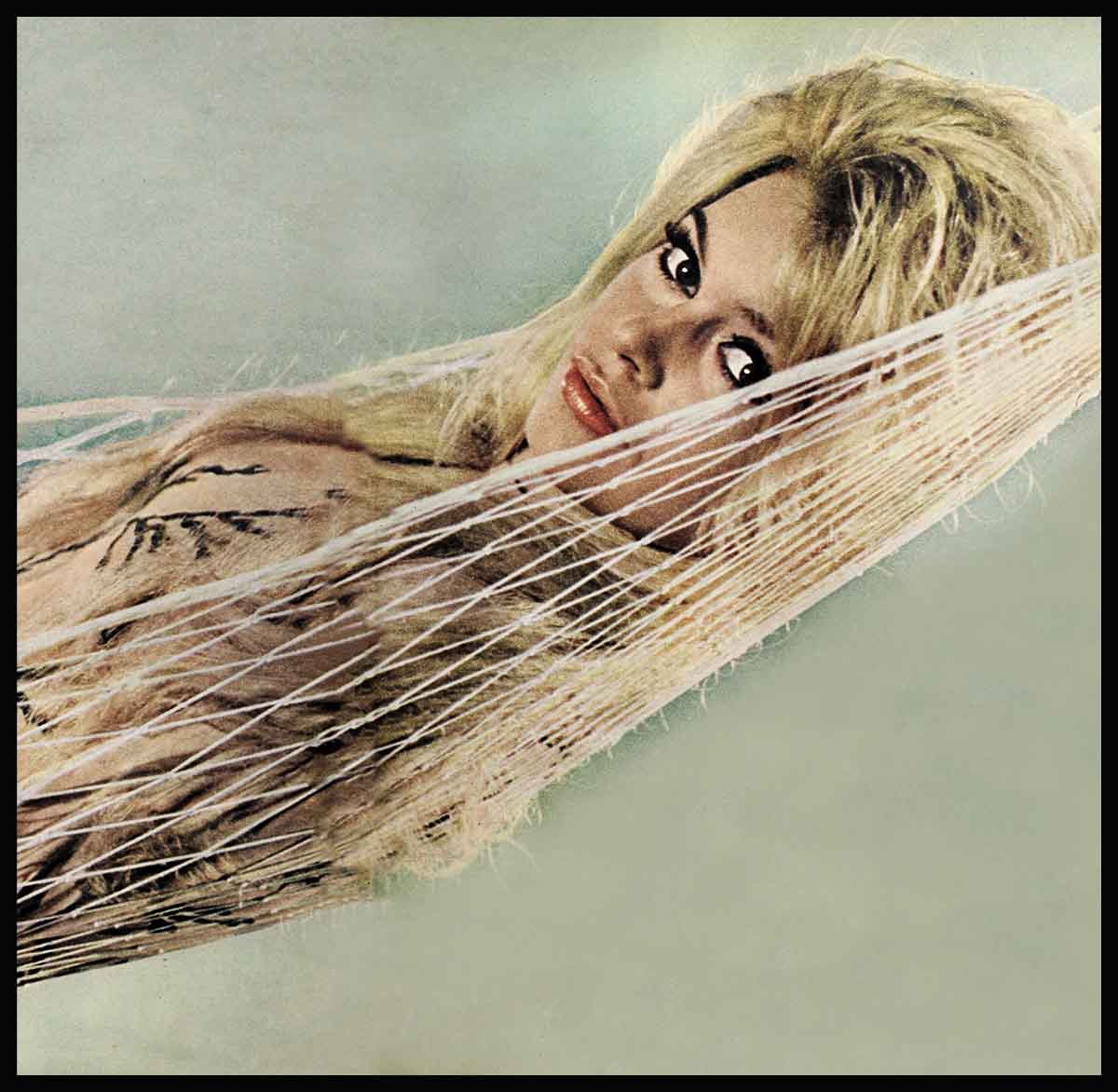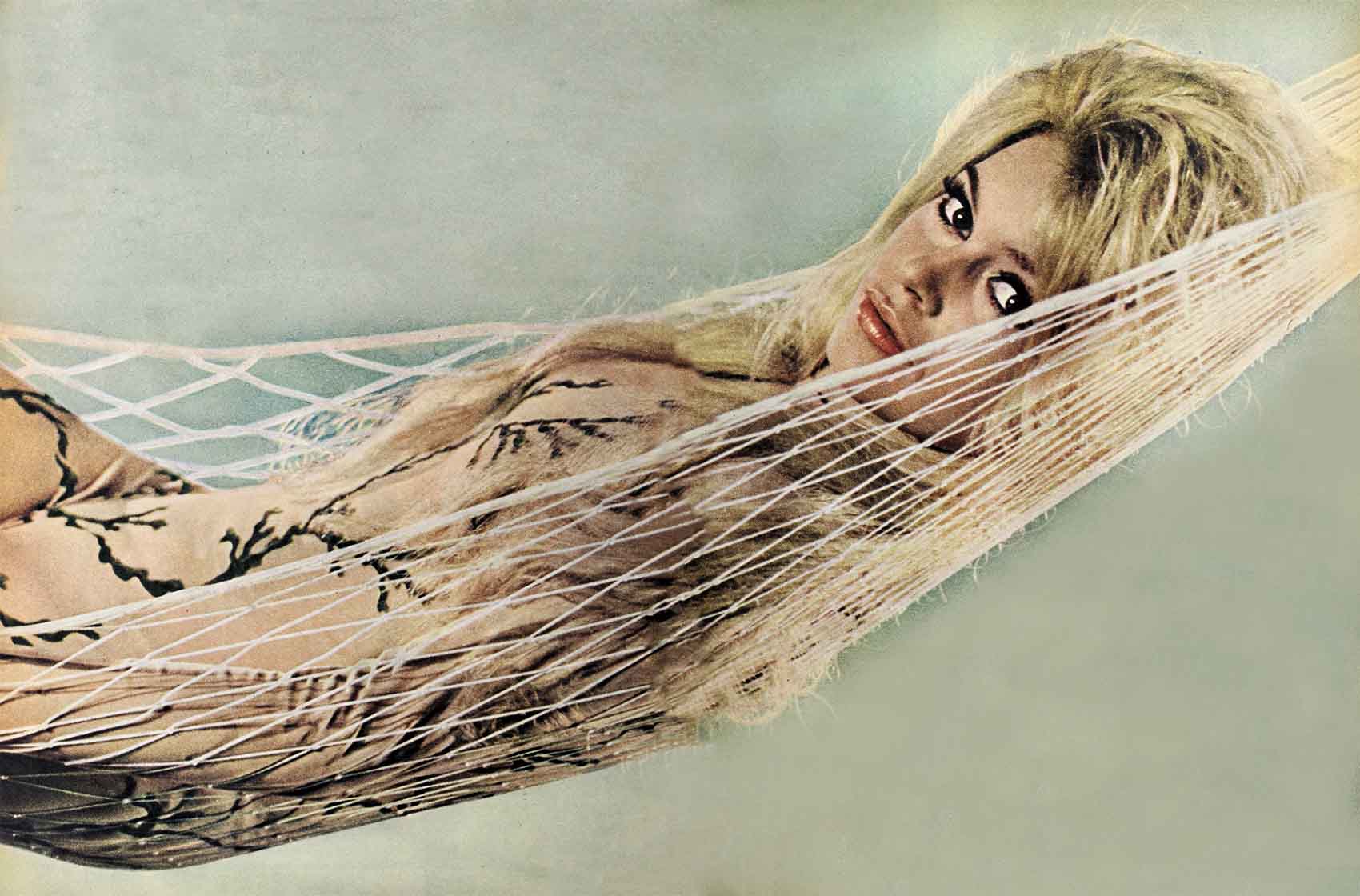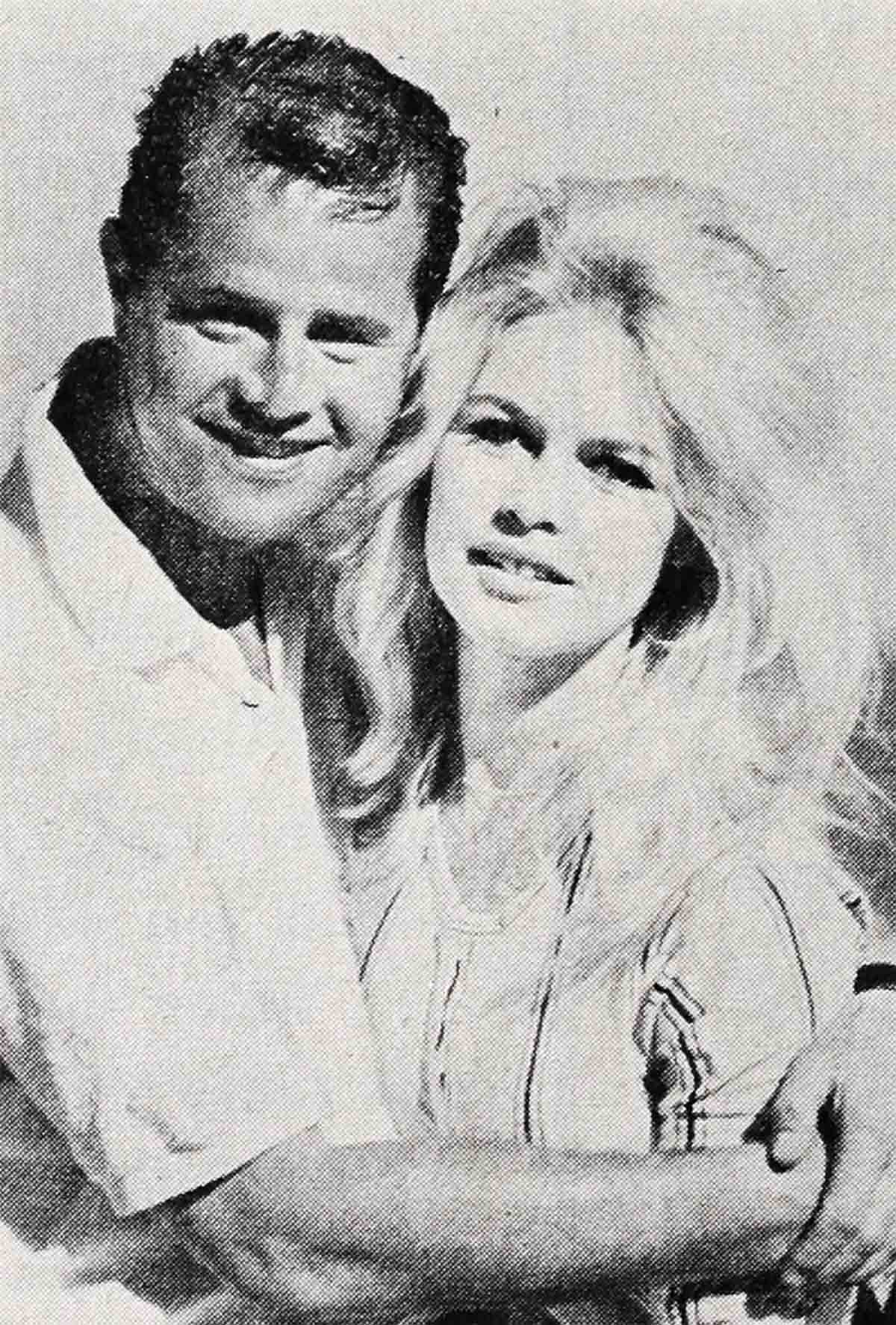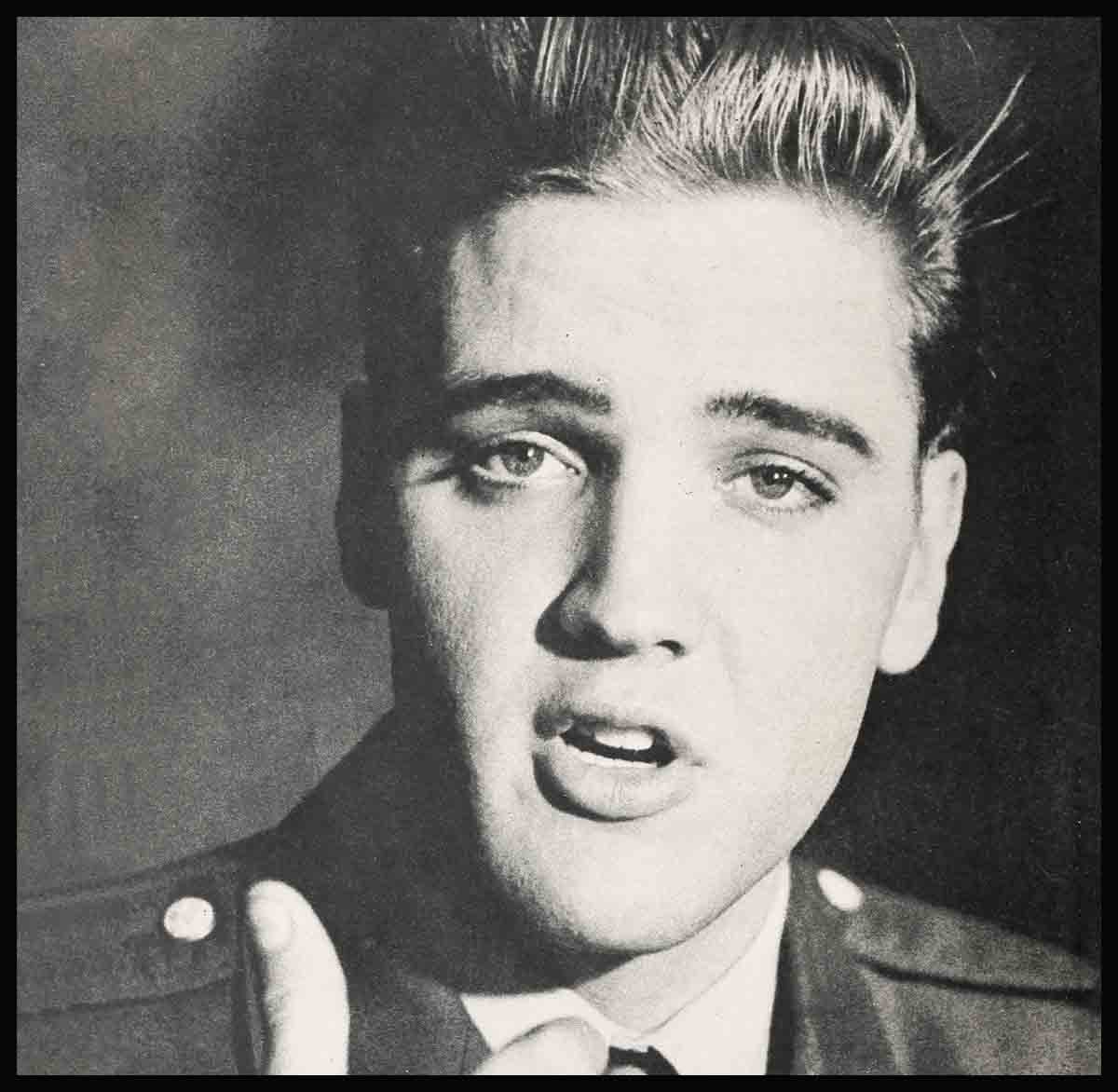
An Intimate Interview with Brigitte Bardot
How lucky can you get? That’s exactly what I, Fred Robbins, was thinking when I got my assignment to go to Italy’s Isle of Capri to do a taped interview with the world-famed sex kitten herself—Brigitte Bardot! Quickly, I packed my trusty tape recorder and boarded the first plane possible—I wanted to get away before anyone changed their minds. Four thousand miles later. I arrived on Capri. Five days later, I flew back to New York. What happened in between could well be the plot of Brigitte’s next movie—if she wants to give up those sexy French plots for a good old American comedy of errors.
Watching Brigitte make a movie (she was on Capri to film Joseph E. Levine’s “A Ghost at Noon”), is a movie in itself. I know, because I watched her for five days.
My first morning there, I arrived on the set bright and early, because La Bardot would certainly do the interview today. I tested my trusty tape recorder and sat down. I sat, and sat and sat! When quitting time came, I was still sitting. It was then that Brigitte’s charming girl Friday, Christine Brierre, smiled and said. “Mr. Robbins, perhaps she will do your interview tomorrow—perhaps, maybe!”
The next morning was a repeat of the day before. That afternoon, for one moment, it looked as if I was in luck. Brigitte started to walk over to where I was sitting. Along the way, someone stopped her and suggested she go water skiing. Never mind the four-thousand miles I’d traveled to see her! Forget the hours I’d sat in the broiling sun! Forget the fact that the interview had been set up by the producer, Joe Levine! Forget all that, she certainly did! Brigitte went water skiing.
The next day La Bardot came to the set in tears. The paparazzi (Italy’s unrelenting corps of news photographers) had been tormenting her and her boyfriend Sami Frey—who was on Capri with her. The paparazzi accused them of breaking a camera and threatened to go to the police unless Brigitte and Sami paid for the damage. She was terribly upset and talked of going back to Paris at once.
It was all anyone could do to get her to film that day—and I didn’t need Miss Brierre to tell me I wouldn’t get my interview. “But, perhaps, maybe,” said she, “Brigitte will do the interview tomorrow. Perhaps.” So I put more suntan lotion on my already sunburned face and rode back to my hotel. It was then I began to hum an old song. Maybe you know it—it goes, “ ’Twas on the Isle of Capri that I met her, beneath the shade of an old walnut tree.” What a farce that song is. I didn’t meet her—and there wasn’t a shade tree for miles—walnut or any kind.
All kidding aside, Capri is one of the most beautiful places on earth. The scenery is too much. If I had to sit and wait for anyone, anywhere, I couldn’t pick a more gorgeous spot. A cooler spot, yes—but not a more gorgeous one. And while I waited, I discovered a few things about Brigitte—some good, some not so good—but all fascinating—in fact, I’d say fantastic.
Brigitte is treated like a queen. You should see how she comes to work—in a private motorboat! The crew, the director, the rest of the cast—everyone—would be on the set for hours. The set for “A Ghost at Noon” was the roof of the abandoned Villa Millaparte, which sits about two hundred feet above the sea on a sheer cliff. The quickest way to get to the roof location is a half-hour ride by boat and then a climb up five flights of steps carved into the cliff. The only other way is by a long, exhausting trek up and down the cliffs.
So, if the cast and crew had assembled there at 9 A.M., let’s say, about 11 A.M. (one day it was after 1 o’clock in the afternoon), a gleeful cry would go up from one of the crew. “Voila, Bardot est arrivee!” Brigitte is coming! Quelle excitement!

Ah, she comes to work!
Like “Cleopatra” sailing down the Nile, Bardot’s boat—a sliver of mahogany with a silver tail—would be visible on the clear blue water, two hundred feet below. The boat would come through the Faraglioni, the two famous rocks that have become the “trademark” of Capri. The brilliant sun sparkles on the water like diamonds, the blinding flashes occasionally hiding the boat from view. But it came closer, closer. I could see Brigitte, her blond hair streaming in the wind, her dark glasses, her pink face. Every pair of eyes was glued on her.
The film’s director. Jean Luc Godard, welcomes her like visiting royalty; handles her like some delicate flower. Her co-star, Jack Palance, gives her a warm hug.
Between takes she climbs back down the five flights of stairs and sits in the corner of her boat, by herself. Or else she sits under a sun umbrella on a corner of the villa’s roof, which is even larger than a basketball court. She is very aloof, and talks only with those she knows well—especially Sami Frey and her girl Friday, Christine Brierre. I’ve already told you about Miss Brierre—she’s the one who keeps saying “Tomorrow, Mr. Robbins, maybe . . . perhaps!” As for Sami, gossip columns have told you about Brigitte’s romance with him. And it is for real—they’re engaged to be married.
Not only the star, but all supplies—cameras, film, costumes, food, water—everything—had to be brought to the remote villa by boat each day. And they had to arrive before Bardot did. Her arrival time was unpredictable, to say the least. It depended on many things—not the least of which was how many people mobbed her at the Marina Grande, from which her speedboat left for the location. And mob her they did, day and night. Did she mind? She certainly did. She complained about her lack of privacy, the tourists, the curious. But not once did she attempt to disguise herself in any way. There was no scarf on her head—always the famed Bardot blond tresses were being whipped up by the wind. I was in Rome with Elizabeth Taylor and she made many shopping trips, with no trouble at all. I’d seen the late Marilyn Monroe walk all over New York with a scarf and dark glasses and be unrecognized by her adoring fans. But Brigitte doesn’t go in for these disguises in Capri. Yet she hates being mobbed.
The paparazzi are another problem. All day long, half a mile across the water from the villa roof, they hide in the bushes on the cliffs like mountain goats. As they inch closer, I’d swear they were going to plunge into the sea—but they never did. Their telescopic lenses would be trained on the set like cannons, and they would be clicking, clicking, clicking. It would be enough to drive me nuts. Bardot is in their sights wherever she goes, constantly bothered and annoyed. Only when she is inside her hotel or hiding behind the wall of the Villa is she out of camera range. Only, too, in her native Paris or her beloved St. Tropez is she left somewhat alone.
After three days of waiting on the set, I got a brilliant idea. My hotel was not far from Brigitte’s (she, Sami and her retinue had taken over a small hotel on Capri). Maybe I could go over to her hotel in the morning before shooting, or at night, or any other time to do the interview. But again, I was told, “Brigitte will do the interview on the set. Maybe . . . perhaps . . . it will be tomorrow.”
After four fruitless days, I was burned up in more ways than one. I figured I couldn’t sit around much longer. That night. I wandered into a small boutique to decide once and for all if I could afford a sweater I’d seen there. I also wanted to pick up something for my wife—who wasn’t too keen on the Bardot interview in the first place.
As I was trying to make up my mind, down the small, winding stairs that led from the main shop to the fitting rooms, came Brigitte, followed by Sami Frey. As she passed me, she put her hand on my arm, smiled and said, “I’ll see you tomorrow.” Well, some sweet, lovable member of the paparazzi snapped a picture just as Brigitte smiled and put her hand on my arm. Within hours, that photograph was being printed up and sent around the world. The caption? Well, I was identified as “Jicky Dussard,” and in case you didn’t know it, I’m supposed to be “Brigitte’s new red-hot romance.” Just call me Jicky!
The next day, I got my interview. The first American interview she’d ever done—and her first in English. Her English? Well, you can judge from the tape—but believe me, it loses everything in the translation.
Brigitte is unlike any “star” I’ve ever met. She’s shy, withdrawn and very afraid of people and places she doesn’t know. There is a childishness about her, and a seemingly complete unconcern for any but her own feelings. This is not done with malicious intent, she is this way because she is scared. Yet once you meet her, she is adorable and very, very sweet. It was with mixed emotions that I finally interviewed her—but when it was over, she gave me a bear-hug that made me forget the five-day wait, the broiling sun, the “perhaps tomorrow, maybe”—everything. And would I do it again? Of course! Brigitte, to me, is like a scared little kitten sitting in a lonely corner of the world. I’d like to help her come out!
Here is the tape to type interview:

At last—le interview!
FRED: (Sings) “ ’Twas on the Isle of Capri that I met her.” Hello, Brigitte Bardot!
BB: Hello!
FRED: How nice to have you on our program.
BB: I’m very glad, too.
FRED: You’re not sitting under an old walnut tree, though, are you, like it says in the song.
BB: No, there is no tree here.
FRED: What do I see there behind you? (Referring to the famous rocks , the Faraglioni, seen in the background.)
BB: I don’t know the name in English.
FRED: Very famous, that scenery. Very famous. What are you doing on the Isle of Capri?
BB: Well. I’m in Capri, but I’m not in love with Capri. There is too much people and too much tourists. I’m here to make a film. “Le Metris”—“A Ghost at Noon.”
FRED: Who is in it with you?
BB: Jack Palance and Fritz Lang, the German director, and Michele Piccoli. And the director is Jean Luc Godard.
FRED: Do you like making a movie on Capri?
BB: Yes, I like making a movie, but in Capri or anywhere else, it is the same—I’m here to work.
FRED: You have made all of your movies in Europe, Brigitte. Over here we want to know, when, oh when, are you going to make a picture in the United States?
BB: (Laughs) I don’t know. I’d like to know the United States first before working there. I’d like to spend a holiday there, but I never find the time.
FRED: Are you afraid of too many people around you? You don’t like it when there are too many people, do you?
BB: I don’t like what I don’t know, and—I’d like to know.
FRED: The way to know is to come—then you will know.
BB: Yes, but if it would be possible for me to come and be quiet, without anyone around. I’d like to come right now!
FRED: Well, you know. Brigitte, you’ve never been to the United States, but you’ve had an enormous influence on our girls as well as on girls all over the world—the way they wear their hair, you’ve seen . . .
BB: (Laughs) Their hair?
FRED: . . . the way they dress, their clothes . . . what do you think about that? Do you like having such a big influence on women everywhere?
BB: I don’t know—I don’t mind.
FRED: It’s very flattering, no?
BB: Yes—but I don’t mind.
She’s got the accent
FRED: You know, if you come to New York, there are so many girls who make themselves look like you do, nobody would know who is the real Brigitte Bardot. You could have all the privacy you want.
BB: Yes, but the others don’t have a French accent. The real Brigitte Bardot has a French accent. (Laughs)
FRED: Very delightful, too. I think the girls would like to know just how you keep that beautiful figure of yours.
BB: I don’t know. (Laughs) I don’t know, really.
FRED: Do you eat whatever you want?
BB: Yes.
FRED: As much as you want?
BB: Oh. Yes.
FRED: Never changes, huh?
BB: No. never.
FRED: Very lucky.
BB: Yes, I am lucky.
FRED: I read that you’re retiring from the screen. Is that true?
BB: Every time when I finish a film, I want to stop with cinema—and after a little while, I want to work again because I adore my job—I adore the cinema.
FRED: Brigitte, being a world famous actress, as you are, what are the problems that you are faced with today?
BB: The big problem is to be a very famous actress. That’s the biggest problem.
FRED: What does that mean in your daily life? How does that affect your daily life?
BB: It’s because I’m not myself—I’m an actress—and everyone looks at me like an actress, and not like Brigitte—do you understand? There’s a big difference. For me it’s a very big problem.
FRED: You would rather be looked at as yourself, huh?
BB: Yes, that’s what I’d like. And I think I prefer myself than Brigitte Bardot.
FRED: I understand that in “A Ghost at Noon” you have both brunette and blond hair. Why do you change colors?
BB: Well, that’s right, I wear a wig—a brown wig—because Jean Luc Godard wanted me to change for some scenes in the film and I have a brown wig—very short hair—and that changed me very much.
FRED: What kind of part do you have in “Ghost at Noon”? What is she like?
BB: It’s a very different part than the other films. It’s a girl very shy, very wild—sauvage—and tres, tres, repliee sur elle-meme . . . I don’t know the English word. . . .
FRED: Introvert!
BB: Exactly! And habitually I play the contrary of this girl. That’s why I’m happy to play this part. It is a good change.
FRED: Very exciting part for you, huh?
BB: Yes, it is exciting, because no one has ever seen me like that, ever! It’s a little part of myself—a side of my character that I have never shown in any film.
FRED: Well, we’ll certainly be looking forward to seeing you in “A Ghost at Noon,” Brigitte, and when you get up enough nerve, to your first visit to America. It’s been un grand plaisir to speak with you and until I see you again—au revoir.
BB: Thank you very much, Au revoir!
—THE END
See Brigitte soon in “A Ghost at Noon,” Embassy. Hear Fred’s “Assignment Hollywood” on coast-to-coast radio. In the New York area, you can hear “Robbins’ Nest” over WNEW, Sundays from 8 to 12 P.M.
It is a quote. PHOTOPLAY MAGAZINE OCTOBER 1963





zoritoler imol
1 Ağustos 2023fantastic post, very informative. I’m wondering why the opposite specialists of this sector don’t understand this. You should continue your writing. I’m sure, you have a great readers’ base already!